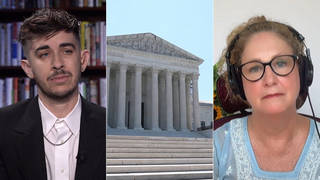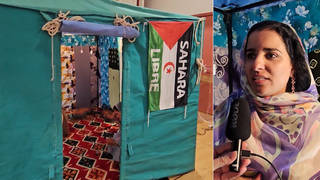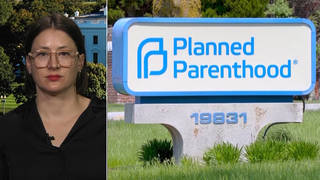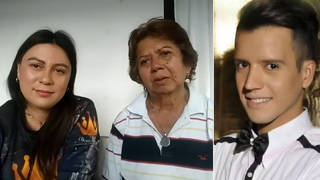
Topics
Guests
- Gregg KeeslingFather of Chancellor Keesling, who took his own life on June 19th while serving his second deployment in Iraq. President Obama hasn’t written his parents a condolence letter because their son’s death was a suicide.
The parents of US Army Reserve Specialist Chancellor Keesling, an Iraq war veteran, received a letter yesterday from the VA asking that their son complete his “Post Deployment Adjustment.” The only problem is, Chance Keesling had killed himself in Iraq nearly five months ago. We speak with Chance’s dad, Gregg Keesling, who’s still waiting for the letter he’s never received: condolences from President Obama. A longstanding US policy denies presidential condolence letters to the families of soldiers who have committed suicide. [includes rush transcript]
Transcript
AMY GOODMAN: We continue on this Veterans Day special with the father of a former soldier. The parents of this soldier, US Army Reserve Specialist Chancellor Keesling, an Iraq war veteran, received a letter yesterday from the VA asking that their son complete his “Post Deployment Adjustment.” The only problem is, Chance Keesling had killed himself in Iraq nearly five months ago.
We first brought you the story of Chance Keesling two weeks ago on Democracy Now! Chance was on his second tour of duty in Iraq when he took his own life on June 19th. During his first deployment, he suffered mental health issues so severe he was placed on suicide watch. Despite this, he was called back to duty in May. He killed himself a month later.
Chance’s parents, Gregg and Jannett Keesling, have yet to receive a letter of condolence from President Obama. After making inquiries, they discovered this was not because of an oversight. Instead, it’s because of a longstanding US policy to deny presidential condolence letters to the families of soldiers who have committed suicide.
Gregg and Jannett Keesling joined us on Democracy Now! to share their story the first time in a national broadcast. Jannett spoke of why she was calling on President Obama to send them a condolence letter.
JANNETT KEESLING: Chancellor was extremely precious to us. And I sat around thinking, he died on foreign soil for us, you know? He sacrificed his young life, six years. And a letter from the President is a little bit of closure to show us that he appreciated our son’s life. And I know he’s busy with a lot of issues, but this is not one that is so hard to change. I mean, it would give us some closure, you know, some feeling of — that we were appreciated or our sacrifice was not in vain. And that’s why I really am pushing forward for families like us who have suffered and will continue to suffer, receives a letter from the President, thanking us for our son’s life or a person’s contribution to this war.
AMY GOODMAN: That’s Chance Keesling’s mother, Jannett Keesling. We’re joined now Gregg Keesling, his father. He’s joining us from Indianapolis, where they both live.
Gregg, since we talked to you and Jannett two weeks ago, you have actually received a letter, but it’s not a letter from President Obama.
GREGG KEESLING: No, it’s a part of a series of letters that we receive from the VA and other agencies who worked with his settlement back into civil society. And we understand the bureaucracy is quite large and, you know, how you — these letters will continue to come, but the post-deployment survey, that kept coming. My wife did write a letter back to the VA. She included the death certificate and said, you know, it’s very painful for us to get these letters. And the VA did call us. They apologized. They said they’re going to work to fix this and — but the letters keep coming. And again yesterday, we got another letter.
And it’s very painful for us, because this is the post-deployment from his first deployment in ’06, when the VA was working with his mental health treatment. And, of course, they have no idea he was called back as a reservist. And this maybe speaks to some of the problems that we’re dealing with with mental health issues between the enlisted Army, the Reserves and the VA.
AMY GOODMAN: Gregg Keesling, when he came back, I mean, he really suffered the first time around, though he was considered a very good soldier.
GREGG KEESLING: Yes.
AMY GOODMAN: And they offered him a bonus to go back. What was it, $27,000?
GREGG KEESLING: Something like that, yes.
AMY GOODMAN: And he said no.
GREGG KEESLING: It was a sizeable amount of money.
AMY GOODMAN: And he said no. But then —-
GREGG KEESLING: He said no.
AMY GOODMAN: —- he was just called up through stop-loss?
GREGG KEESLING: It’s not stop-loss. When you sign up the military, you give a commitment to serve as an enlisted soldier, and then you give a corresponding amount of time as a reservist. And they offered him money so they would not have to have the time between his — you know, his duty in Iraq as enlisted and then, of course, being sent back. And they asked him to go back quicker.
He turned that down because of his mental health issues. And as a family, we thought that by the time the two years — because it prevented them from deploying him for two years, we thought, well, this war will be over by that time. But when the orders came down, we talked quite extensively about whether he should go back. But he said, “Dad, I’m a soldier. I’m strong. I want to go back. I’ll serve my country. I’m going to get through this.” But sadly, it was the wrong decision for us to make as a family.
AMY GOODMAN: He took his own life in Iraq. He served in the military for six years. You wrote a letter back now to the military as a result of these letters that are coming in?
GREGG KEESLING: Yes, we wrote — I worded it fairly strongly. I mean, we do want to be sympathetic to bureaucracies and how hard it is to get — to stop information, you know, information about his flu shots and just all kind of information that’s coming from the VA. But I certainly believe that the VA and the Army can put together a system to know when a soldier dies. He died in the war theater. And I know they have the ability to make that information pass to all the relevant agencies and organizations that are working on his resettlement back after war. And I just appealed to them to fix it.
It’s harassment, you know, and especially in fact that our son did commit suicide at war. He was being treated at the VA for this same issue, and now they’re writing, “How did we do?” And in my letter, I said, “You didn’t do very well. It didn’t work out very well.”
AMY GOODMAN: Gregg Keesling, as you were receiving this letter, President Obama was addressing the troops at Fort Hood yesterday. What are your thoughts on what happened there?
GREGG KEESLING: Well, certainly I have a lot of sympathy for all the families that have lost their loved ones from this horrible tragedy and those that have been injured. I do know — I have some sense of what those families — the loss that they’re feeling right now.
You know, this is Veterans Day, and I think it’s important that we honor all soldiers and everybody in the military who has given great sacrifices in furtherance of the security of this country. So, you know, in some small way, I did feel that President Obama, maybe way deep in the back of his mind, had Chancellor in his mind as he was making a superhuman effort, and he and Michelle Obama were reaching out to those families, offering them deep and very good condolences for the suffering and the grief that they’re experiencing. And at some small little level, it gave me comfort.
Also his trip to Dover, the filming of that, it was an Indiana family that allowed that filming to occur. And that — so that picture that the country got when he saluted that coffin of the Indiana fallen soldier when he passed also gave me some small amount of comfort that, you know, somewhere way in the back of his mind that maybe Chance was there, too, in his condolences.
AMY GOODMAN: You went to Dover when your son’s body was brought back.
GREGG KEESLING: Yes.
AMY GOODMAN: You spoke to a chaplain there about the number of suicides and —-
GREGG KEESLING: Yeah.
AMY GOODMAN: Tell us about that.
GREGG KEESLING: Well, we just believe that this issue, Chance’s issue, is a mental health issue. It’s something that I’m growing to better understand. My last conversation with my son was “Be a man. Get over this.” And, you know, in hindsight, that was the wrong thing to say to him, and it’s part of my grief that I’ll deal with. If he had said to me, “Dad, I have a broken leg,” or, “Dad, I have cancer, and I can’t go on,” I would have understood that. But I don’t think, as a country, we fully understand mental health. We have made tremendous strides. You know, historically, religiously, it’s been considered a sin. And I think today that’s -— we understand that it’s also mental health, that it’s a deep part of the people’s struggle with mental health issues.
So, as we go through the longest war in our history since Vietnam and multiple deployments using civilian soldiers, like the reservists and the Guard, in ways we have never used in this country, we have to be very conscious that mental health issues are going to impact these soldiers. It’s going to — in some cases, like in our son’s, it’s going to lead to the ultimate decision to end the pain and suffering that our son made. But I think it — you know, the commander-in-chief, the leader of our country, needs to send a strong message about mental health.
We’ve made tremendous changes. Previously, we could not have gotten a military burial. We could have not gotten the flag ceremony, that the military so graciously administered at our son’s funeral, and the handing of the flag to my wife, the death benefit that was awarded as all soldiers who die in the war theater. So all of those policies have changed, because they are recognizing that mental health is an issue, that we can’t punish the families of soldiers who suffer with mental health issues.
AMY GOODMAN: Finally —-
GREGG KEESLING: And I just think -—
AMY GOODMAN: Gregg Keesling, Dahr Jamail wrote in a piece, “Fort Hood soldiers have accounted for more suicides than any other Army post since the US invasion of Iraq in 2003. [In] this year alone, the base is averaging over 10 suicides each month — at least 75 have been recorded through July of this year alone.”
When we spoke to you yesterday, you said you know why this happened at Fort Hood. What did you mean?
GREGG KEESLING: Well, I just know that the soldiers there are — and it’s not just related to Fort Hood; it’s related to every single place. The soldiers are under tremendous, tremendous strain. These are mental health issues. We need to focus on the mental health issues of our soldiers in our military, and we need to do it in an aggressive way, and we need to do it now.
AMY GOODMAN: And please let us know if you receive that letter of condolence, war condolence, from President Obama.
GREGG KEESLING: I hope. I hope Michelle Obama watches, and maybe she can have some impact on this.
AMY GOODMAN: Gregg Keesling, I want to thank you for being with us, father of Chancellor Keesling, who took his own life on June 19th, while serving in Iraq. He had served in the military for six years. The family, Jannett and Gregg Keesling, are still waiting for a letter of war condolence from President Obama.













Media Options